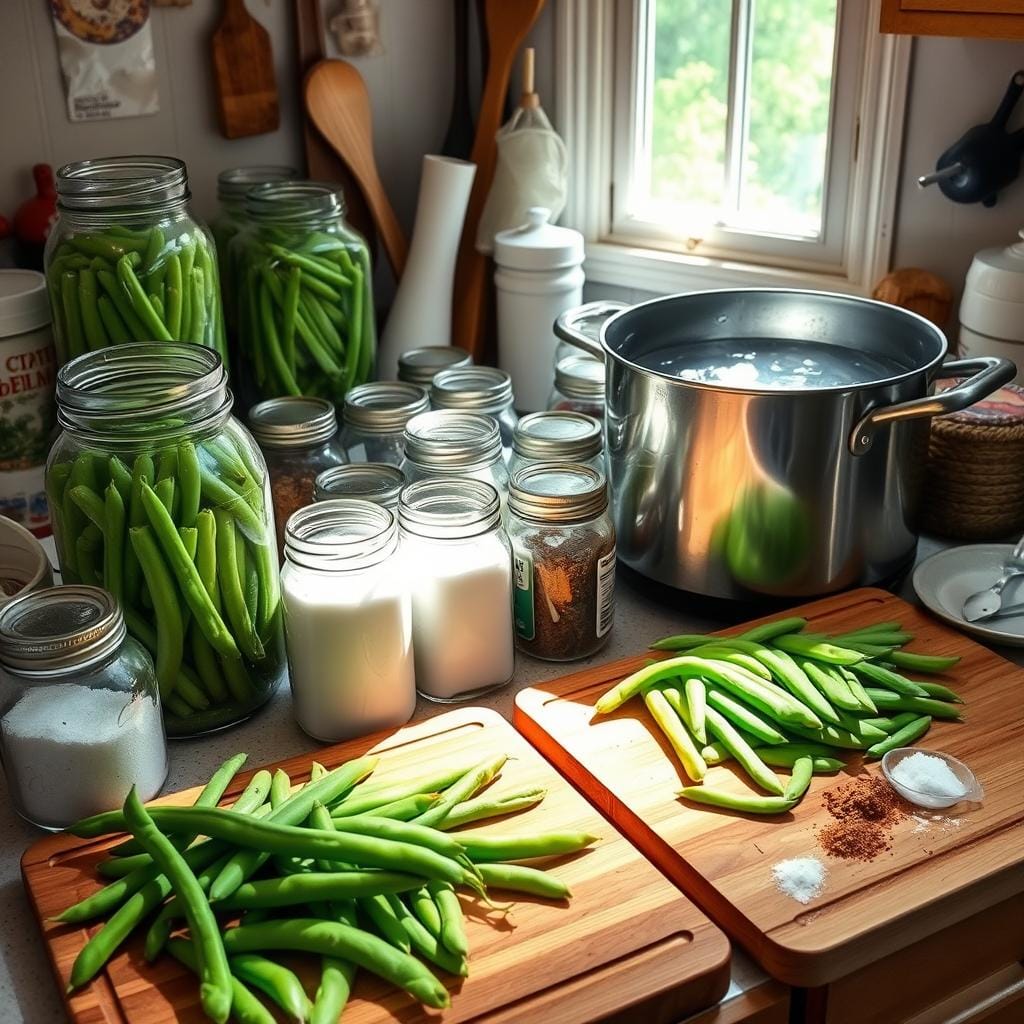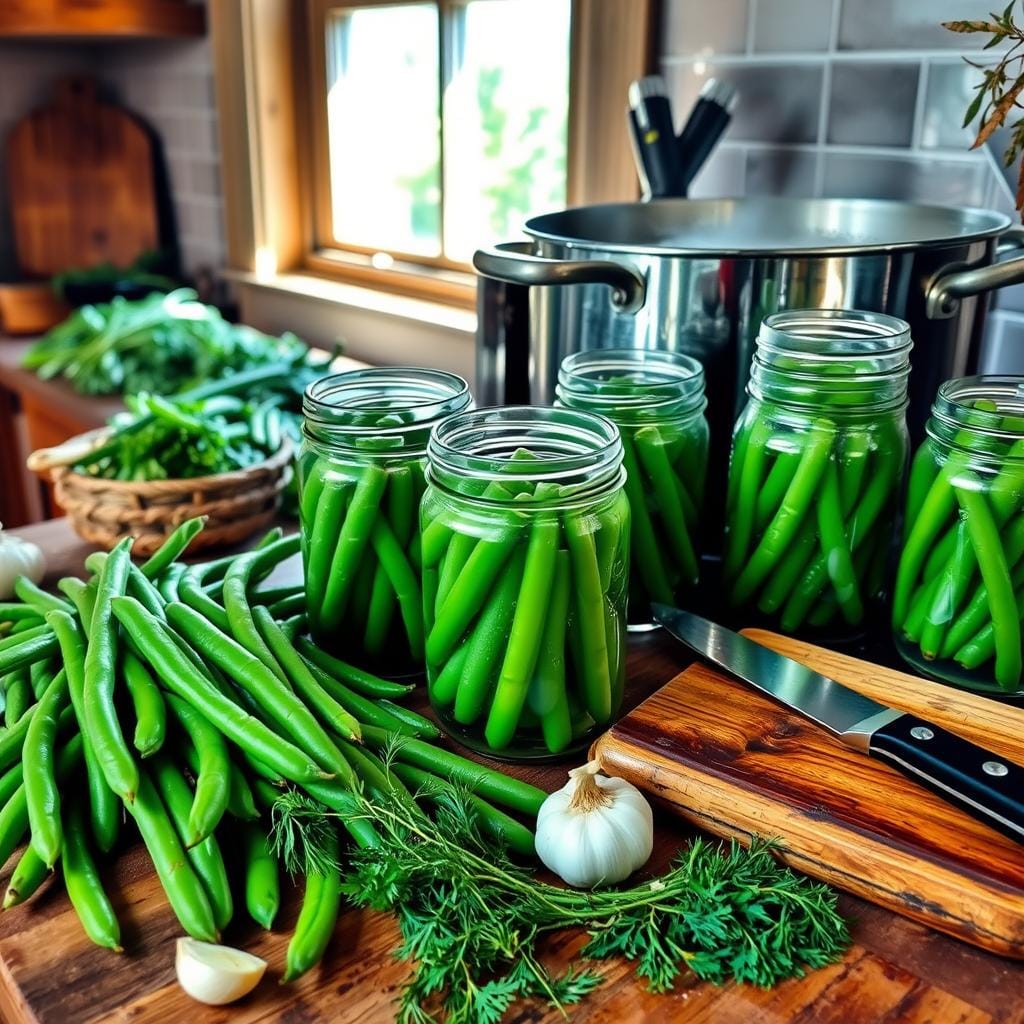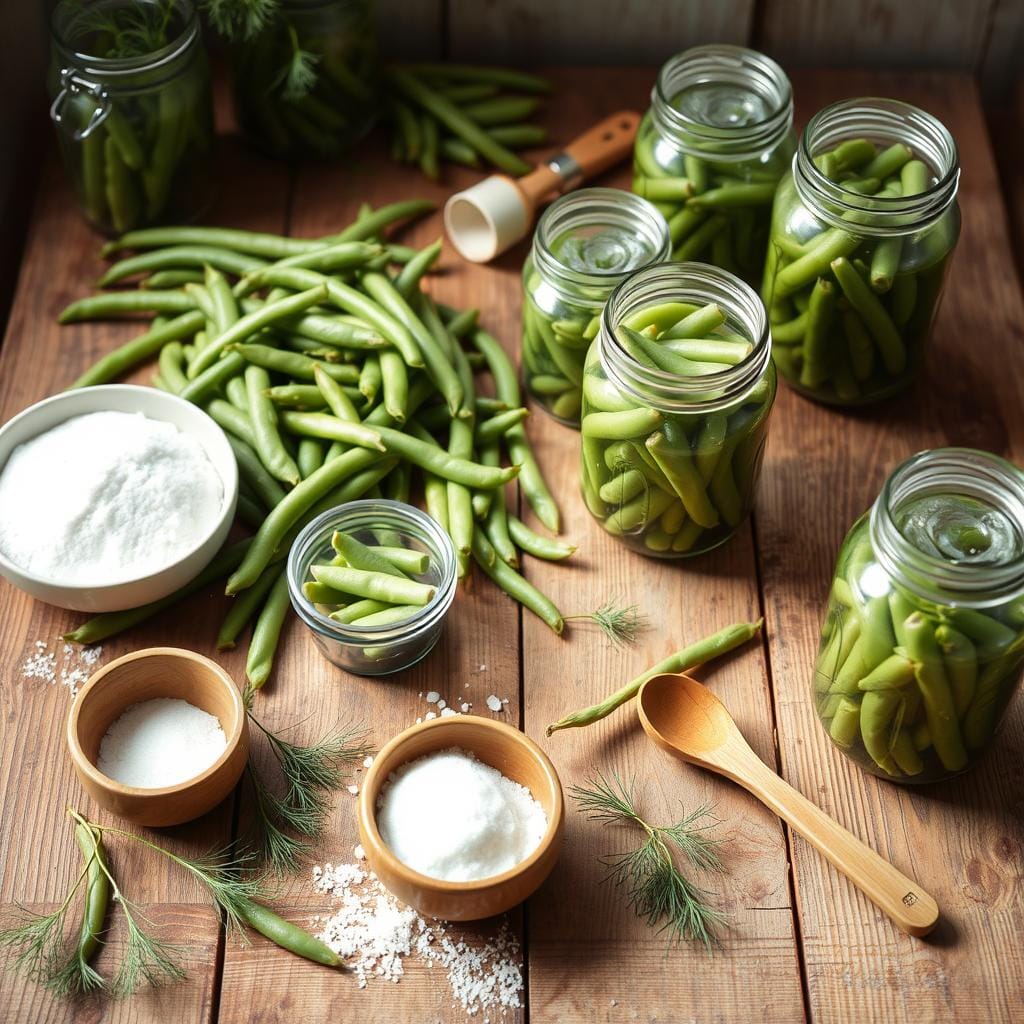What ingredients do I need to can green beans? Preserving summer’s flavors for the colder months is deeply rewarding. Standing in your kitchen, surrounded by fresh green beans, brings the warmth of summer indoors. Canning green beans not only saves homegrown goodness but also fosters a connection to the earth for your family to enjoy year-round.
Knowing the right ingredients is key. It makes sure your canned beans are not only healthy but also full of flavor. Let’s start preserving green beans together, one jar at a time.
Key Takeaways
- Canning green beans helps to retain their freshness and nutrition.
- Essential ingredients play a crucial role in the flavor and quality of your preserved beans.
- Choosing the right green bean canning ingredients simplifies the canning process.
- Understanding ingredient options can enhance your green bean canning experience.
- Preserving green beans at home gives you the satisfaction of homemade goodness.
Understanding Canning Green Beans
Canning green beans is a detailed process that lets you keep these fresh veggies for a long time. By sealing food in jars under vacuum, you stop microbes from growing. This keeps your canned goods safe and tasty.
When you’re canning green beans at home, knowing the safety rules is key. Using the right tools and following tested recipes makes canning fun. You might wonder, what ingredients do I need to can green beans? Knowing the basics improves your canned beans’ quality and boosts your canning skills.

In short, learning the basics of canning, especially with green beans, is crucial. Spend time learning the needs and safety steps. This way, you’ll enjoy home-canned green beans that will impress your loved ones for months.
What Ingredients Do I Need to Can Green Beans?
To can green beans, you need to know the must-have ingredients and the extras that add flavor. You’ll learn what to use and how to make your green beans taste amazing.
Essential Ingredients for Canning
Choosing the right green beans is key. You’ll also need:
- Fresh green beans
- Water (preferably filtered)
- Salt (canning or pickling salt is recommended)
- Vinegar (optionally, for slight acidity)
These items help keep your green beans tasty and safe. They make sure your canned goods are delicious and ready for your pantry.
Optional Additives for Flavor
Want to spice up your green beans? Try these optional additives for flavor:
- Garlic cloves
- Onion slices
- Dried herbs such as thyme or dill
- Spices like black pepper or red pepper flakes
These extras can make your green beans even better. You can mix and match to find your favorite flavor.

| Ingredient | Type | Purpose |
|---|---|---|
| Fresh Green Beans | Essential | Main component |
| Water | Essential | Liquid for filling |
| Salt | Essential | Flavor enhancer, preservation |
| Vinegar | Optional | Acidity for flavor |
| Garlic | Optional | Flavor profile |
| Onions | Optional | Flavor profile |
| Herbs & Spices | Optional | Flavor enhancement |
Choosing Fresh Green Beans
Knowing which green beans are best for canning helps you make better choices. Each type adds its own flavor and texture. This lets you meet different tastes and needs.
Types of Green Beans Suitable for Canning
Some of the most loved green beans for canning are:
- Snap Beans – These are tender, slightly sweet, and keep their color and crunch when canned.
- Bush Beans – Bush beans are small, easy to grow, and pack a lot of flavor and nutrients for canning.
- Pole Beans – Pole beans need a trellis but give a longer harvest. They add a strong flavor to canned dishes.
How to Select Quality Green Beans
Choosing the right green beans is key for great canned food. Here’s how to pick the best:
- Look for freshness: Bright green and glossy beans are full of life.
- Check for firmness: Beans should be crisp and snap when squeezed, showing they’re of good quality.
- Avoid any signs of spoilage: Watch out for brown spots, wilting, or soft skin. These can ruin the whole jar.
Canning Supplies You Need
Before you start canning, you need the right supplies. Knowing what you need makes the process easier and safer. The right tools help ensure your homemade green beans turn out great.
Essential Equipment for Home Canning
Getting the right tools is key for canning. Here’s a list of must-haves:
- Pressure Canner or Water Bath Canner: These are crucial for processing jars safely.
- Jar Lifters: They give you a firm grip to lift hot jars.
- Funnel: A funnel makes pouring green beans into jars easy and mess-free.
- Bubble Remover: This tool removes air bubbles in jars for a tight seal.
Recommended Canning Jars and Lids
Choosing the right jars and lids is important for canning success. Here are some top picks:
| Type of Jar | Size | Best Use |
|---|---|---|
| Regular Mouth Mason Jars | Quart (32 oz) | Perfect for canning green beans and other veggies |
| Wide Mouth Mason Jars | Pint (16 oz) | Great for packing bigger cut veggies |
| Standard Lids | Regular & Wide Mouth | Recommended for a tight seal during processing |
Preparing Your Green Beans for Canning
Before you start canning green beans, make sure you have a plan. Gather all the needed supplies like a clean work area, cutting board, and sharp knife.
Begin by washing the green beans under cool water. This removes dirt and pesticides. Then, cut off the ends to make the beans uniform and remove tough parts.
Next, cut the beans into 1 to 2-inch pieces. This size fits well in jars. You can adjust the length based on your preference for using the beans.
Now, it’s time for blanching. Blanching improves color, texture, and preserves nutrients. For more on blanching, check out this useful link.
After blanching, cool the beans in an ice bath. This stops the cooking and keeps them crisp. Proper preparation makes your canned green beans taste better.
Follow these steps to ensure your canning is successful. These initial steps are key to keeping your green beans fresh and flavorful.
Step-by-Step Guide for Canning Green Beans
Canning green beans at home is a process that keeps them fresh for a long time. It’s important to know how to prepare your green beans right. This guide will help you blanch and pack them perfectly.
Blanching the Green Beans
Blanching green beans is a key step in canning. It helps keep their color, texture, and taste. Start by boiling a big pot of water. Have an ice bath ready to stop the cooking.
When the water boils, add the green beans. Blanch them for 3 to 5 minutes. Then, quickly move them to the ice bath to cool down.
Packing the Jars Properly
After blanching, it’s time to pack the jars. This step is crucial for keeping the green beans fresh. Use clean jars and pack the blanched beans in them.
Leave about 1 inch of space at the top of each jar. This space is important for expansion during processing. Use a non-metallic spatula to remove air pockets. A good seal is key to keeping your canned goods fresh.
| Step | Action | Duration |
|---|---|---|
| 1 | Boil water | Until boiling |
| 2 | Add green beans | 3-5 minutes |
| 3 | Transfer to ice bath | Until cool |
| 4 | Pack in sterilized jars | Ensure 1 inch headspace |
| 5 | Remove air pockets | As needed |
Preserving Green Beans Safely
Learning how to preserve green beans safely is key. The right processing time affects their taste, texture, and how long they last. Knowing the difference between water bath and pressure canning helps you get the best results.
Importance of Processing Time
Following the right processing times is crucial for green beans. This time ensures your jars are heated enough to kill off bad bacteria and enzymes. If you don’t heat them enough, your beans might spoil and be unsafe to eat. Here are some standard times for different canning methods:
| Canning Method | Processing Time (for Pint Jars) | Processing Time (for Quart Jars) |
|---|---|---|
| Water Bath Canning | 40 minutes | 55 minutes |
| Pressure Canning | 20 minutes (at 10 PSI) | 25 minutes (at 10 PSI) |
Understanding the Water Bath vs. Pressure Canning
Choosing between water bath and pressure canning affects your green beans. Each method has its own benefits for different foods.
- Water Bath Canning: Great for high-acid foods, it keeps the flavor and texture of your green beans crisp. But, it takes longer, which might change the taste.
- Pressure Canning: Best for low-acid foods, it uses high heat to kill bacteria. It’s faster, keeping your green beans fresh and safe.
Choosing the right method is important for the quality of your green beans. Knowing the differences helps you pick the best way to preserve them safely.
Common Mistakes in Canning Green Beans
Canning green beans is a fun and rewarding task. It helps keep food fresh and adds flavor to meals. But, many people make mistakes that can ruin the taste and safety of the beans. Knowing these mistakes can help you can better and safer beans.
One big mistake is incorrect processing times. Beans can become mushy if cooked too long. Or, they might not be safe if cooked too short. Always check a trusted canning recipe for the right cooking time for your beans.
Another mistake is poor jar sealing. Make sure jars are clean and lids are on right before you start. Check the lid after it cools; it should be indented. If not, the seal failed, and your beans might spoil.
Using the wrong jars is another error. Always use jars made for canning, like Mason jars. Don’t use old jars for canning. The right jars are key to a successful canning experience.
Lastly, forgetting to check for air bubbles before sealing is a mistake. Air bubbles can cause spoilage. Make sure to pack jars tightly and adjust the beans to avoid air pockets.
Knowing these common mistakes can make your canning better and safer. You’ll get delicious results every time.
Storing Your Canned Green Beans
Storing canned green beans right is key to keeping them fresh and tasty. Knowing how to store them well means they stay good for a long time. You’ll learn about the best storage conditions, like temperature, humidity, and light.
Best Practices for Storage
Here are some tips for storing canned green beans:
- Temperature Control: Keep them in a cool, steady spot, between 50°F to 70°F. Hot temperatures can spoil them faster.
- Humidity Levels: Store them in a dry area. Too much moisture can cause rust and spoilage.
- Light Exposure: Place them in a dark spot. Sunlight can harm the quality over time.
- Labeling: Mark each can with the canning date. This helps you know which ones are oldest and should be used first.
- Rotation: Use the “first in, first out” rule. This way, you use the oldest jars first, reducing waste.
By sticking to these storage tips, you can keep your canned green beans fresh and flavorful. Enjoy your home-canned goods knowing they’re stored properly.
| Storage Factor | Ideal Condition |
|---|---|
| Temperature | 50°F – 70°F |
| Humidity | Low |
| Light Exposure | Dark |
| Labeling | Date of Canning |
| Rotation Method | First In, First Out |
Tips for Delicious Green Bean Canning Recipes
Adding exciting flavors to your canned green beans can make them truly special. Try out different seasonings to give your green beans a unique taste. This way, you can make your canning recipe your own.
Creative Ways to Season Your Canned Green Beans
Seasoning your green beans during canning adds a new level of flavor. Here are some ideas to get you started:
- Garlic and Herb Blend: Mix minced garlic, thyme, and rosemary for a fragrant flavor.
- Spicy Kick: Add red pepper flakes or jalapeños for a spicy twist.
- Asian Inspiration: Soy sauce and sesame oil give a savory, ethnic flavor.
- Vinegar Zing: Balsamic or apple cider vinegar adds a tangy taste.
These seasonings let you tailor your canned green beans to your liking.
Variations on Traditional Canning Recipes
Adding new ingredients to your green bean recipe can result in amazing flavors. Here are some ideas to try:
- Pickled Green Beans: Use vinegar, dill, and mustard seeds for a tangy taste.
- Italian Style: Mix tomatoes, olive oil, garlic, and Italian seasoning for a rich flavor.
- Southern Style: Add bacon and cayenne pepper for a smoky taste.
These variations not only make your green beans unique but also more versatile. For more ideas, check out ingredient suggestions that go well with canned green beans.
Conclusion
Learning about canning green beans has been a journey. You now know the key ingredients, how to prepare them, and safety tips. Choosing fresh green beans is key for great taste and texture. Also, following the right steps in preparing and processing is vital for safe storage.
Feel free to get creative with your canning. Try new seasonings and recipes to make your green beans stand out. This way, you can turn simple green beans into tasty side dishes. Proper storage will keep your canned beans fresh, ready for you to enjoy all year.
Now, you’re ready to start canning green beans at home. Enjoy the process, be proud of your work, and savor the fruits of your labor. For more ideas, check out casseroles with canned beans to add a twist to your meals.

